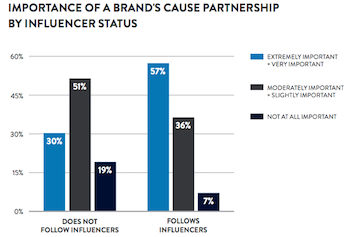The use of influencers in online marketing campaigns has grown markedly in recent years, but the efficacy of leveraging spokespersons to raise brand awareness and drive engagement has been a topic of much debate.
When it comes to the use of influencer marketing campaigns in cause-related spaces such as charities, however, a June report issued by San Francisco-based agency Allison+Partners might put that debate to rest.
According to the MDC Partners unit’s Influence Impact Report, cause-related marketing campaigns that rely on influencers appear more likely to inspire people to engage with that cause and dedicate their time and resources to it, suggesting that this breed of marketing could be a vital component for marketers with a cause-related client.
According to the report, more than a third of those who follow online influencers — 35 percent — said they engaged with a cause due to an influencer’s recommendation, and an additional 31 percent said they were open to the idea of engaging with a cause simply due to an influencer’s recommendation.
 |
Of the 35 percent who admitted following the influencer’s recommendation, more than half — 52 percent — said they later spread awareness of that cause, and a similar amount — 51 percent — said they made a financial donation. An additional 37 percent said they now even volunteer for the organization promoted by the influencer.
Of those who follow digital influencers, 43 percent additionally said they now engage with that cause at least once a month.
The study also suggests that influencer-backed cause campaigns are especially effective when consumers deem the campaigns authentic, and when they provide stories from people who've been affected by the issue in question.
Of those who follow digital influencers, 62 percent said their trust in influencers is particularly earned when that spokesperson personally volunteers for the organization, 61 percent said they trusted the cause when the influencer shares stories from those who have been impacted by it, and 60 percent said they’re won over if the influencer was personally affected by the cause in some way.
Facebook seems to be the preferred social media forum for those following digital influencers, cited by 70 percent of respondents. YouTube ranked at a distant second, at 45 percent.
For those who follow digital influencers, nearly a third —30 percent — said they find brands’ charitable partnerships to be “extremely important,” and three-fourths — 75 percent — found brands that were purpose-driven to be “extremely/very important.” Members of the Millennial generation, as well as those belonging to Gen Z, were among respondents who reported being more wont to participate in cause campaigns, with 34 percent and 38 percent of these age groups, respectively, claiming to have volunteered or donated at least once a month.
The use of influencers to reach consumers continues to transition from one strategy among many in the marketer’s toolkit to an essential component of today’s marketing campaigns. A December survey by marketing agency Acorn: The Influence Company found that 84 percent of marketers plan to enact an influencer marketing campaign at some point this year, and a 2017 report from content marketing technology company Linqia discovered that 86 percent of marketers are now using influencer marketing as part of their content strategy.
Allison+Partners’ Influence Impact Report was compiled using three separate studies carried out in April: an online survey of more than 1,000 U.S. adults conducted by research company Qualtrics; an online survey of 1,000 self-identified online influencer followers using brand intelligence research company Survata; and an online survey of more than 1,000 U.S. adults also using Survata.


 Consumers continue to place a premium on corporate responsibility, but they increasingly want to see that responsibility directed toward issues that affect the bottom line, according to a new study from Mission North
Consumers continue to place a premium on corporate responsibility, but they increasingly want to see that responsibility directed toward issues that affect the bottom line, according to a new study from Mission North Not all pressing issues require corporate voice! Brand stewards must must ask why and when their brands should engage, or if they need to engage on a particular issue at all.
Not all pressing issues require corporate voice! Brand stewards must must ask why and when their brands should engage, or if they need to engage on a particular issue at all. Dollar General investors voted in support of a shareholder resolution at its May 31 annual meeting for an independent third party audit of “worker safety and well-being.”
Dollar General investors voted in support of a shareholder resolution at its May 31 annual meeting for an independent third party audit of “worker safety and well-being.” Nonprofits and philanthropists have a unique opportunity to take ownership of conversations surrounding pressing social issues.
Nonprofits and philanthropists have a unique opportunity to take ownership of conversations surrounding pressing social issues.


 Have a comment? Send it to
Have a comment? Send it to 
No comments have been submitted for this story yet.